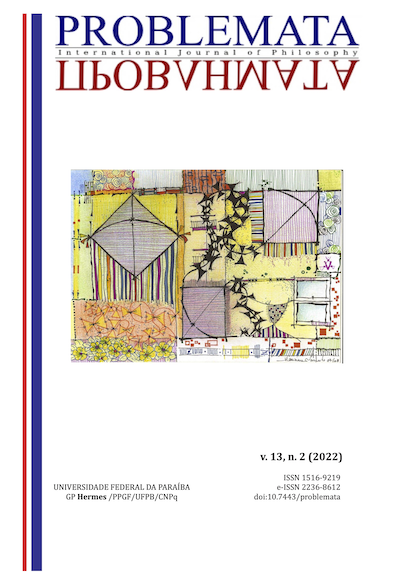THE IMPORTANCE OF THE HISTORICAL AND EPISTEMOLOGICAL PERSPECTIVE AS A COUNTERPOINT TO A VIEW OF SCIENCE AS DEFINITIVE KNOWLEDGE
DOI:
https://doi.org/10.7443/problemata.v13i2.62359Keywords:
Epistemologia, Ciência, revolução científica, história, dogmatismoAbstract
The scientific goal can be summarized as the quest to expand the explanatory capacity of the world. To this end, Science takes a particular aspect of an object as a starting point for investigation, in order to describe its measurable properties. Despite being a highly compartmentalized and specialized view of nature, this format, established in the 17th century, henceforth became the dominant view of the world and the expression of truth. At the same time, its aspects of fallible, provisional and conjectural knowledge, although fundamental to human progress, have been replaced by a discourse of unassailable, counterproductive and anti-pedagogical infallibility. It is in academic training the moment to approach the historical and epistemological aspects that characterize scientific activity, exemplified here in six points, that a more human view of Science and represented as an eternally provisional attempt to explain phenomena can manifest itself.
Downloads
References
BEHE, M. 1996. Darwin's black box: The Biochemical Challenge to Evolution. Free Press, 1996.
CHALMERS A. What Is This Thing Called Science? Hackett Pub. Co. Inc.; 4th ed., 2013.
CHALMERS, A. 1990. Science And Its Fabrication. Univ Of Minnesota Press; 1st ed., 1990.
COELHO, L. A Ciência na idade média. Lisboa: Guimarães editors, 1988.
FEYERABEND, P. Against the method. Verso; 4th ed., 2010.
FLUSSER, V. Temas em debate: A Ciência e a nossa situação. Revista Brasileira de Filosofia, XV (59), p. 344-360, 1965.
HAMELIN, G. 2018. Ciência e Saber. A importância da concepção platônica da natureza da epistêmê em Aristóteles. J. anc. philos. (Engl. ed.), Smo Paulo, v.12, n.1. p. 1-21, 2018.
HESSEN, J. Teoria do conhecimento. 3 ed. São Paulo: Martins Fontes, 2012.
KUHN TS. The Structure of Scientific Revolutions. University Of Chicago Press; 3rd ed., 1996.
MILL, J.S. On Liberty and Other Essays. Oxford Paperbacks; 1st ed., 2008.
MOSER, P.; MULDER, D.H.; TROUT, J.D. The Theory of Knowledge: A Thematic Introduction. Oxford University Press, USA; Illustrated ed., 1997.
POPPER K. The Logic of Scientific Discovery. Routledge; 2nd ed., 2005.
POPPER, K.R. 2002. Conjectures and Refutations: The Growth of Scientific Knowledge. Routledge; 2nd ed., 2002.
REALE, G. Saber dos antigos- Terapia para os tempos atuais. 4ed. São Paulo: Edições Loyola, 2014.
REALE, G; ANTISERI, D. Revolução científica. In: REALE, G; ANTISERI, D. Filosofia:
Idade Moderna (Volume 2). São Paulo: Paulus Editora; 1ª ed, 2018. p. 185-317.
SCHAFFNER, K.F. Theory Structure in theBiomedical Sciences. The Journal of Medicine and Philosophy, vol. 5, no. 1, 1980.
SCHMIDT P.; SANTOS, J.L. O pensamento epistemológico de Karl Popper. ConTexto, v. 7, n. 11, p.1-15, 2007.
SMITH, W. Cosmos and Transcendence: Breaking Through the Barrier of Scientistic Belief. Angelico Press; Reviseded, 2008.
VARELLA, R.B. A pandemia de COVID-19 e os limites da Ciência. Physis. vol. 32, n. 1, 2022.
WHITEHEAD, A.N. The Aims of Education and Other Essays. Free Press; Reissue ed. 1967.
ZAGO, J.A. 2015. Mito, verdade e um conceito de ciência. Revista eletrônica de Filosofia da UesB. Ano 3, n 1, 2 0 1 5.
ZAGO, J.A. A ciência ainda está interessada
na verdade? Rev. Filosófica São Boaventura, Curitiba, v. 9, n. 2, p. 61-73, 2015.
Downloads
Published
Issue
Section
License
Copyright (c) 2022 Rafael Varella

This work is licensed under a Creative Commons Attribution 4.0 International License.
Authors who publish with this journal agree to the following terms:
- Authors retain copyright and grant the journal right of first publication with the work simultaneously licensed under a Creative Commons Attribution License that allows others to share the work with an acknowledgement of the work's authorship and initial publication in this journal.
- Authors are able to enter into separate, additional contractual arrangements for the non-exclusive distribution of the journal's published version of the work (e.g., post it to an institutional repository or publish it in a book), with an acknowledgement of its initial publication in this journal.
-
- Authors are permitted and encouraged to post their work online (e.g., in institutional repositories or on their website) prior to and during the submission process, as it can lead to productive exchanges, as well as earlier and greater citation of published work (See The Effect of Open Access).





